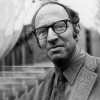Thomas Kuhn

Thomas Kuhn
Thomas Samuel Kuhnwas an American physicist, historian, and philosopher of science whose controversial 1962 book The Structure of Scientific Revolutions was influential in both academic and popular circles, introducing the term "paradigm shift", which has since become an English-language idiom...
NationalityAmerican
ProfessionPhilosopher
Date of Birth18 July 1922
CountryUnited States of America
Thomas Kuhn quotes about
men evaluation facts
Its assimilation requires the reconstruction of prior theory and re-evaluation of prior fact, an intrinsically revolutionary process that is seldom completed a single man and never overnight
men vision lenses
Literally as well as metaphorically, the man accustomed to inverting lenses has undergone a revolutionary transformation of vision.
men fields youth
Almost always the men who achieve these fundamental inventions of a new paradigm have been either very young or very new to the field whose paradigm they change.
men lenses scientist
Rather than being an interpreter, the scientist who embraces a new paradigm is like the man wearing inverting lenses.
men discovery design
The man who is striving to solve a problem defined by existing knowledge and technique is not, however, just looking around. He knows what he wants to achieve, and he designs his instruments and directs his thoughts accordingly. Unanticipated novelty, the new discovery, can emerge only to the extent that his anticipations about nature and his instruments prove wrong... There is no other effective way in which discoveries might be generated.
men break-through practice
Individuals who break through by inventing a new paradigm are almost always either very young men or very new to the field whose paradigm they change. These are the men who, being little committed by prior practice to the traditional rules of normal science, are particularly likely to see that those rules no longer define a playable game and conceive another set that can replace them.
men taught looks
What a man sees depends both upon what he looks at and also upon what his previous visual-conceptual experience has taught him to see.
fully individual occurs revolution scientific stable
What occurs during a scientific revolution is not fully reducible to a reinterpretation of individual and stable data.
alone candidate faith neither nor particular rational though ultimately
Crisis alone is not enough. There must also be a basis, though it need be neither rational nor ultimately correct, for faith in the particular candidate chosen.
political-revolution favors way
Political revolutions aim to change political institutions in ways that those institutions themselves prohibit. Their success therefore necessitates the partial relinquishment of one set of institutions in favor of another, and in the interim, society is not fully governed by institutions at all
data doe different
Though the world does not change with a change of paradigm, the scientist afterward works in a different world... I am convinced that we must learn to make sense of statements that at least resemble these. What occurs during a scientific revolution is not fully reducible to a re-interpretation of individual and stable data. In the first place, the data are not unequivocally stable.
philosophy law able
What chemists took from Dalton was not new experimental laws but a new way of practicing chemistry (he himself called it the 'new system of chemical philosophy'), and this proved so rapidly fruitful that only a few of the older chemists in France and Britain were able to resist it.
science may world
The historian of science may be tempted to exclaim that when paradigms change, the world itself changes with them.
normal fit scientist
No part of the aim of normal science is to call forth new sorts of phenomena; indeed those that will not fit the box are often not seen at all. Nor do scientists normally aim to invent new theories, and they are often intolerant of those invented by others.